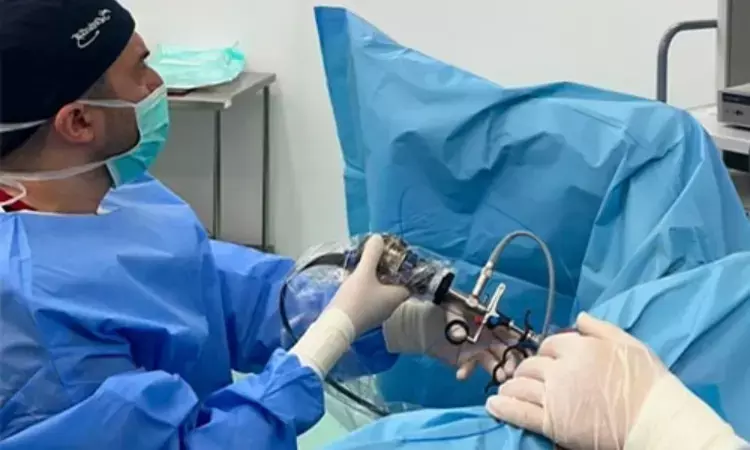- Home
- Medical news & Guidelines
- Anesthesiology
- Cardiology and CTVS
- Critical Care
- Dentistry
- Dermatology
- Diabetes and Endocrinology
- ENT
- Gastroenterology
- Medicine
- Nephrology
- Neurology
- Obstretics-Gynaecology
- Oncology
- Ophthalmology
- Orthopaedics
- Pediatrics-Neonatology
- Psychiatry
- Pulmonology
- Radiology
- Surgery
- Urology
- Laboratory Medicine
- Diet
- Nursing
- Paramedical
- Physiotherapy
- Health news
- Fact Check
- Bone Health Fact Check
- Brain Health Fact Check
- Cancer Related Fact Check
- Child Care Fact Check
- Dental and oral health fact check
- Diabetes and metabolic health fact check
- Diet and Nutrition Fact Check
- Eye and ENT Care Fact Check
- Fitness fact check
- Gut health fact check
- Heart health fact check
- Kidney health fact check
- Medical education fact check
- Men's health fact check
- Respiratory fact check
- Skin and hair care fact check
- Vaccine and Immunization fact check
- Women's health fact check
- AYUSH
- State News
- Andaman and Nicobar Islands
- Andhra Pradesh
- Arunachal Pradesh
- Assam
- Bihar
- Chandigarh
- Chattisgarh
- Dadra and Nagar Haveli
- Daman and Diu
- Delhi
- Goa
- Gujarat
- Haryana
- Himachal Pradesh
- Jammu & Kashmir
- Jharkhand
- Karnataka
- Kerala
- Ladakh
- Lakshadweep
- Madhya Pradesh
- Maharashtra
- Manipur
- Meghalaya
- Mizoram
- Nagaland
- Odisha
- Puducherry
- Punjab
- Rajasthan
- Sikkim
- Tamil Nadu
- Telangana
- Tripura
- Uttar Pradesh
- Uttrakhand
- West Bengal
- Medical Education
- Industry
Pre-operative kidney disease negatively affects outcomes of endoscopic BPH surgery: Study

Lebanon: In a recent study leveraging the extensive National Surgical Quality Improvement Program (NSQIP) database, researchers delved into the intricate relationship between kidney disease and perioperative outcomes following endoscopic surgery for benign prostatic hyperplasia (BPH). The findings, published in the World Journal of Urology, shed light on the significant impact of kidney disease on surgical outcomes, emphasizing the importance of tailored approaches for patients with underlying renal conditions.
The study found that pre-operative kidney disease may pose an increased complication risk for patients undergoing endoscopic BPH surgery. The study notes a lack of information on the effect of pre-operative kidney disease on endoscopic BPH surgeries in the literature.
"In endoscopic BPH surgery, there is a heightened risk of complications for those with impaired renal function," the researchers reported.
"Patients with mild to moderate kidney disease faced increased risks of renal complications (OR 2.43), while those with severe kidney disease faced higher odds of pneumonia (OR 4.02), sepsis/septic shock, renal & cardiac complications, prolonged hospital stays, and need for blood transfusion."
Rami W. Nasr, American University of Beirut Medical Center, Beirut, Lebanon, and colleagues sought to assess the impact of kidney function in patients with BPH undergoing surgery before Transurethral resection of prostate (TURP), Laser Vaporization of the prostate (LVP), and Laser enucleation of the prostate (LEP) on operative and post-operative outcomes using the ACS-NSQIP database.
For this purpose, the research team reviewed the ACS-NSQIP database for patients who underwent LEP, TURP, and LVP for treating BPH patients between 2008 and 2021. Comorbidities, demographics, operative time, surgical procedures performed, and bleeding disorders were collected to compare between Kidney function groups: G1, normal/high function; G2-G3, mild/moderate kidney disease; and G4-G5, severe kidney disease.
A multivariate logistic regression analysis was performed while adjusting for all confounding variables, and the 30-day peri-operative complications were measured. Propensity score matching was performed between the G1 and G4-G5 cohorts.
The study led to the following findings:
· 83,020 patients were included. On multivariable regression, in the G2-G3 cohort, patients were at significantly increased risk for renal complications with OR = 2.43[1.56–3.79].
· After propensity score matching, the G4-G5 cohort showed increased odds of pneumonia OR = 4.02, cardiac complications OR = 4.53, renal complications with OR = 7.62, and sepsis/septic shock OR = 1.76.
· They also had a higher need for blood transfusion OR = 3.58, and prolonged hospital stay with OR = 1.49.
"The literature lacks information on the effect of pre-operative kidney disease on endoscopic BPH surgeries," the researchers wrote. "There is a need for further studies to compare post-operative outcomes of LVP and LEP as compared to TURP across kidney function status."
Reference:
Nasrallah, O.G., Herrera, M.T., Heidar, N.F.A. et al. Impact of kidney disease on perioperative outcomes of endoscopic BPH surgery: a propensity score matched analysis from the NSQIP database. World J Urol 42, 337 (2024). https://doi.org/10.1007/s00345-024-05039-5
Dr Kamal Kant Kohli-MBBS, DTCD- a chest specialist with more than 30 years of practice and a flair for writing clinical articles, Dr Kamal Kant Kohli joined Medical Dialogues as a Chief Editor of Medical News. Besides writing articles, as an editor, he proofreads and verifies all the medical content published on Medical Dialogues including those coming from journals, studies,medical conferences,guidelines etc. Email: drkohli@medicaldialogues.in. Contact no. 011-43720751


